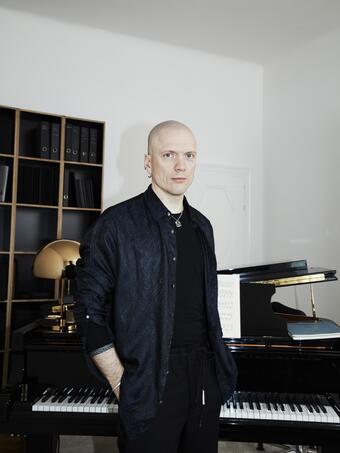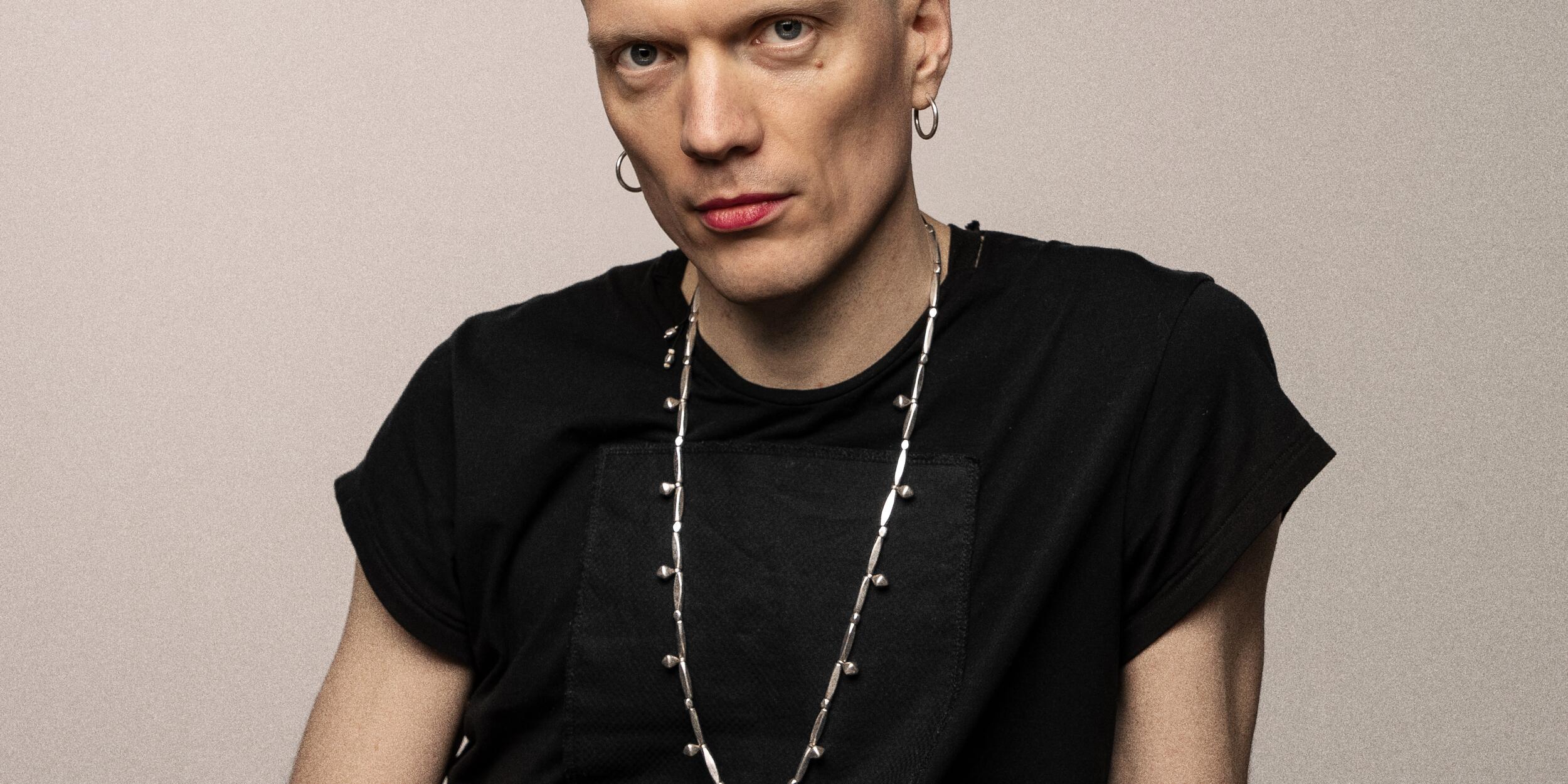"In Abeyance. In abeyance. Or in five sections from A to Z. The latest piece by Laure M. Hiendl (*1986, all pronouns), composer* and performer* between concert music, music theater, installation and performance and since 2021 assistant professor* of composition at the Mozarteum University, is quieter than many of her earlier works. The explicit and frontal of pieces like "White Radiance TM" or "Ten Bullets Through One Hole," which explore the political dimensions of products like skin-bleaching creams or the disturbing analogies of the languages of heteromasculine mainstream pornography and weapons-industry propaganda, gives way to a less confrontational, though no less political, setting. "It was important to have done it that way. But I also realize that I compose differently now," Hiendl sums up. It is his first compositional work without electronics for an analog ensemble and definitely not a concert piece in the classical, linear sense. Rather, it is an attempt, inspired by the theories and thoughts of the recently deceased American cultural theorist Lauren Berlant, to draw a kind of musical tableau vivant that exists in space and time and shows itself in permanently, almost imperceptibly changing new perspectives. The score of the piece is logically the result of a copy-and-paste process, in which the notation of two lightweight ten-seconds from Ralph Vaughan William's Epilogue to the opera "Job" is constantly reassembled in different ways. In the course of the 42 minutes "in a state of limbo", the audience inevitably experiences that uncomfortable, deeply unsettling feeling that Lauren Berlant describes in her key work of social analysis "Cruel Optimism" (2011): being stuck in an extended present in which it is no longer possible to go forward, backward, and in the best case only sideways. According to Berlant's thoughts, this state of affairs can be traced back to the "cruel optimism" that began to set in during the 1980s - when the promises of political and social equality and justice, of upward mobility and job security, of democracy and progress slowly began to dissolve without anyone wanting to admit it. For many people, however, according to Berlant, social advancement has in fact long since ceased to be a possibility, rather the opposite: the omnipresent threat of social decline renders obsolete the linear idea of progress in Western historiography that has shaped our historical consciousness for centuries - it has been thwarted by the centrifugal, self-destructive forces of neoliberal capitalism. Images such as that of the "cul-de-sac," which at best still keeps the present moment open, have thus become the aesthetic metaphor of the hour: "The cul-de-sac is a space of time lived without a narrative genre. ... [It] is decompositional - in the unbound temporality of the period, it marks a delay that demands activity." The image of the "animated still life" thus became the starting point of "In Abeyance": "[…] the living paralysis, the playful repetition, or the animated still life has become a convention of representing the impasse." Making music experienceable not as linear temporal art with a clear stage-audience separation, but as performative, integrative or improvised spatial art, is also the premise of the festival "Music Installations," which Laure M. Hiendl will implement together with dramaturge, curator and author Bastian Zimmermann in Nuremberg in July 2022. "Everything we know from the traditional concert format is committed to a strong linear dramaturgy, which also comes from a linear historical consciousness - we want to break with that. The idea for this project has been haunting me for 10 years now, and I'm very happy that it has now worked." For three years, the duo worked on the applications for the "Festival for Space-Time-Body-Musics" and just a few days ago received a commitment from the German Federal Cultural Foundation for it. "The support has been overwhelming from many sides. Especially that of the Stabsstelle Ehemaliges Reichsparteitagsgelände Nuremberg and its director Joachim Wagner, who wants to open up this non-place to make it a cultural venue." Eight music installations, mainly durational performances over several hours, will be part of the festival. "This also means that the physicality of the performers* in connection with the space in which they move musically comes strongly to the fore. We as the audience can enter these spaces. But then there is not a narrative that we follow. The goal of these installations is to confront us as viewers with a landscape of events that may initially overwhelm us, but in the face of which we then have to decide where to direct our perception. In these moments, it is often the physicality of the performers that invites us to enter into a relationship with them. It can be participatory, interactive, maybe the bodies are like moving sculptures. I'm thinking, for example, of the works of choreographer Tino Sehgal or the Lithuanian trio Rugilė Barzdžiukaitė, Vaiva Grainytė and Lina Lapelytedė, who were awarded the Golden Lion for their opera installation "Sun & Sea (Marina)", in which a beach situation becomes a staging of human life over many hours," Hiendl sums up. Another important source of inspiration for Laure M. Hiendl has always been the outstanding African-American thinker and composer George Lewis, who is known for his theories and positions on improvisation, among other things. "The fact that I was able to complete my doctorate with him at Columbia University in New York was enormously enriching for me," Hiendl says. In his dissertation "Queer Composition. Subversive Strategies in Western Classical Music," is primarily about queer composing as a political conception, which has a strongly deconstructive but also reconstructive component. Pauline Oliveros, known worldwide for her "Sonic Meditations," is a good example: through improvisation, electronic music, rituality and meditation, she has created a body of work that reveals a range of visions that turn all established hierarchies on their heads. "Her compositions are not linear, but performative. They do something to us. They change us," Hiendl says. Lauren Berlant also talks a lot about the subject of improvisation and about crises, which are almost exclusively negotiated in the general public as the exception to the normal state. But it's actually the other way around: the crisis is the normal state in which we have to improvise. The idea of improvisation not only as musical expression, but as something that permanently accompanies us in everyday life, has a strong political dimension. "Anyway, nothing is not political - even if in music there is still the idea, resting on a long tradition but thoroughly naive, that it is not political. You notice this particularly strongly at music universities, because even today the focus is usually on the craft and less on the contextual embedding. One of my goals at the Mozarteum University is to change this in the long term. First of all, within the framework of a new PhD In-the-Arts program, which I am helping to conceptualize. It will probably start in the winter semester of 2022/23." (First published in Uni-Nachrichten / Salzburger Nachrichten on December 11, 2021)

